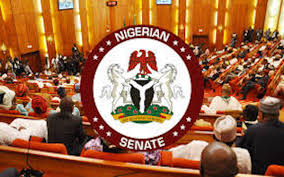***Adeyemi says scarcity of diesel cause for non-completion of projects
The Senate on Tuesday extended implementation of the 2021 Appropriation Act from 31st March to 31st May, 2022.
The scarcity of diesel they said affected some of the capital projects captured in the 2021 budget as most of the earthmoving equipments could not be deployed to site.

The extension got the upper legislative chamber’s approval following the consideration of a bill to Amend the 2021 Appropriation Act.
The Senate before considering the bill suspended Rule 78(1) of the Senate Standing Orders 2022 (as amended), to enable the upper chamber to expeditiously introduce and pass the bill.
The bill was read on Tuesday for the first, second and third time after the suspension of Rule 78(1).
The bill was sponsored by the Senate Leader, Senator Yayah Abdullahi (Kebbi North).
Leading debate on the bill, Senator Abdullahi, recalled that prior Appropriation Acts in the past were passed mid-year, with their implementation usually extended to the following year.
The lawmaker, noted that in previous Appropriation Acts, these extensions were usually covered by a Clause, in line with the provisions of Section 318 of the Constitution of the Federal Republic of Nigeria, that the Act runs for a period of 12 months, starting from the date it comes into effect.
He, however, observed on the contrary that Clause 12 of the provisions of Section 318 of the Constitution provides that the 12 month period starts from the 1st day of January to 31st day of December, 2021.
He recalled that the 2022 Appropriation Act was amended to extend the implementation year from 31st December, 2021 to 31st March, 2022.
Senator Abdullahi, explained that the extension of the budget period became imperative in view of the need to complete ongoing projects nearing completion.
He said, “As you are aware, the 2021 Virement of the aggregate sum of N276 billion was approved for several MDAs by the National Assembly in December, 2021 along with 100 percent release of the 2021 Capital Budget of the MDAs.
“A significant portion of the releases to the MDAs has been utilized following the extension to 31st March, 2022.
“In view of the critical importance of some key projects nearing completion, it is expedient to grant further extension of the expiration clause to avoid compounding the problem of abandoned projects given that some of the projects were not provided for in the 2022 budget hence the need to extend the implementation year form 31 March, 2022 to 31st May, 2022.”
Senator representing Kogi West while supporting the bill said, “When President Muhammadu Buhari came to power he did what was unusual by going ahead to complete projects inherited. In essence this government believes that projects must be completed. “All the major projects that this administration inherited they are actually completing them so it is going to be out of place if we allow projects to be abandoned .
“More importantly why this amendment is desired is to ensure that those projects that were captured in 2021 budget are completed.
“Why this is so is the fact that in the last 2 to 3 months we had crises of diesel which is the main fuel for most earthmoving equipments, so many projects are at very slow stage of completion because diesel is not available, where it is available it is adulterated.
The lawmaker said he had visited a number of sites and saw that many earth moving equipments were abandoned so I think it is desirable we extend the 2021 appropriation so that all the projects would be completed.
According to him by so doing we will be improving the socio economic development of our nation and put smiles on the faces of Nigerians who will be working there
The bill to amend the 2021 Appropriation Act was, thereafter, passed sequel to its consideration by the Committee on Supply.




